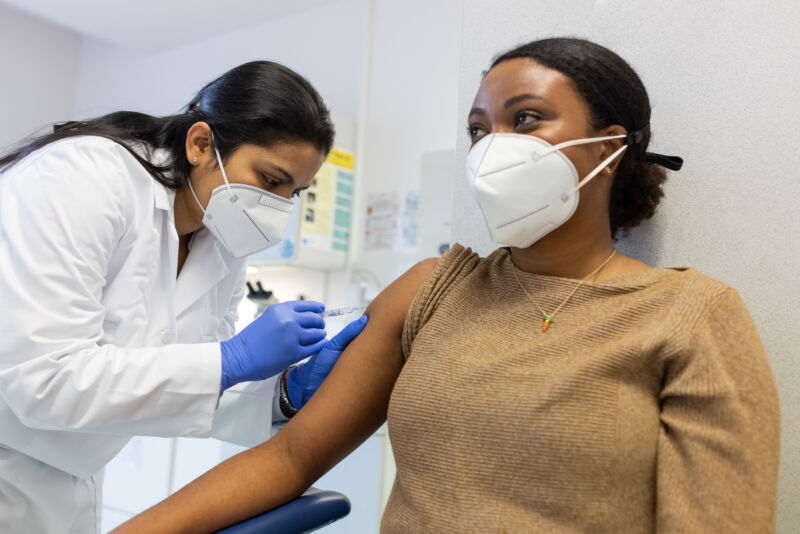
Before the COVID-19 pandemic, it was possible to believe that the US public’s skepticism of scientific information had some limits. Once a crisis hit a critical point—when things became a matter of life and death—people would come around, the thinking went.
Obviously, that hasn’t been the case. The US public’s skepticism toward science is extending toward one of its most important developments: vaccines. The COVID-19 vaccines offer both the prospect of a return to normal life and limits on the risk of dangerous coronavirus variants evolving—but only if enough people are vaccinated. And that “but” is looming larger as states are having to experiment with various inducements to get more people to take the vaccine.
Given this situation, any data that helps us understand why people might be hesitant to get vaccinated could be valuable. Some researchers have now found a hint that trust in science is more complicated than an individual belief. The societal consensus on trust in science matters, too.
Trust and society
The new work was done by Patrick Sturgis, Ian Brunton-Smith, and Jonathan Jackson and relied on data from the Wellcome Global Monitor, a massive survey that has data from over 120,000 people in 126 countries. The data comes from 2018, so it’s from before the pandemic, but the researchers focus on general attitudes toward science and vaccines, so the results are still likely to be relevant. Still, it would be interesting to see the work repeated to see if anything has changed.
Past research indicates that trust in science correlates with confidence in vaccines. That idea was consistently replicated in the countries examined here. It’s also not especially surprising, as vaccines are the product of scientific research and high-technology production facilities.
The issue the researchers studied in the new work is subtly different; they were interested in the societal consensus, or lack thereof, regarding trust in science. Put simply, we’re all influenced by what the people around us think. For people who don’t have the time or inclination to check into an issue in detail, the societal consensus on a topic is often all they have to go on.
So it’s reasonable to expect the consensus on trust in science to have an additional influence on people’s views, including their thinking about vaccines. Or, as the researchers put it, “The same social pressures that lead individuals to converge toward the normative consensus in society on science are also likely to encourage people to conform to widely shared beliefs about the benefits and risks of vaccination.”
Finding consensus
But how to measure that? Here, science’s reputation creates a bit of a challenge. Globally, 80 percent of people surveyed in the Wellcome Global Monitor had some or a lot of trust in science. Even by country, the range of trust was fairly narrow, going about 12 points above and below that 80 percent figure.
Still, the researchers found that the standard deviation in this trust figure varied from country to country. If data, like the survey responses, has a symmetrical-looking curve, you can think of the standard deviation as a measure of the width of the curve. The wider the curve, the higher the standard deviation. Or, in this case, the higher the standard deviation, the more diverse the views on science in a country’s population.
Using the standard deviation as a measure of the societal consensus, the researchers found a stronger consensus in countries with higher levels of formal education and lower levels of income inequality.
To test the data’s effects on vaccination, the researchers measured people’s trust in science and their confidence in the safety and effectiveness of vaccines. Once the impact of individual trust was controlled for in the data, it was possible to examine whether the societal level of trust accounted for some of the remaining differences. And it did—even once the individual effects were removed, people in societies with a stronger consensus on the trust in science had greater confidence in vaccinations.
It’s important to note that this research takes place against a backdrop of high levels of trust in science; even in those countries with diverse views on the topic, the overall trust in science was well over 50 percent. So we don’t really know what things would look like in cases where a weak consensus includes a substantial population with low trust in science.
Still, researchers have obvious ways to follow up on this study. The US has seen a rising distrust in science within conservative circles—the same group that shows the highest levels of mistrust in the COVID vaccine. So there’s an obvious target population to look at where these effects may be playing out. And if we want to get the pandemic fully under control, we may need to find ways to build a consensus within this population.
Nature Human Behavior, 2021. DOI: 10.1038/s41562-021-01115-7 (About DOIs).
https://arstechnica.com/?p=1765440

